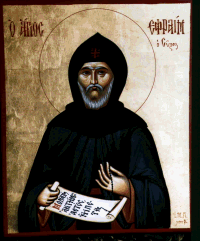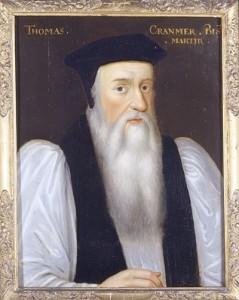Lent Madness continues this morning with an intriguing (aren't they all?) match-up between Ephrem of Edessa and Thomas Cranmer. Will the "Harp of the Holy Spirit" be played by the author of the first Book of Common Prayer? Only you and the next 24 hours will decide.
In recent action, David Oakerhater bested Martin of Porres by a nose. Or, technically speaking, it was by the hair of a nostril -- with over 2,100 votes cast, David won by a mere 15 votes. If you didn't think your vote counted, you were wrong!
 Nicknamed ‘the harp of the Holy Spirit,’ Ephrem (306-373) was a renowned Syrian teacher, poet, orator and defender of the faith.
Nicknamed ‘the harp of the Holy Spirit,’ Ephrem (306-373) was a renowned Syrian teacher, poet, orator and defender of the faith.
Ephrem was born in Nisibis, which is the modern Turkish town of Nusaybin, on the border with Syria. At 18 he was baptized by the Bishop of Nisibis and accompanied him to the famous Council of Nicea in 325.
Ephrem carved out a career as a teacher where he founded the School of Nisibis, which later became a center of learning of the Syriac Orthodox Church. It was here that Ephrem carved out his reputation as a writer, credited by one historian as having authored 3 million lines, such as this: “No one has seen or shall see the things which you have seen. The Lord himself has become the altar, priest, and bread, and the chalice of salvation. He alone suffices for all, yet none suffices for him. He is Altar and Lamb, victim and sacrifice, priest as well as food.”
More than 400 of Ephrem’s hymns still exist. His style can be traced to three traditions; Rabbinic Judaism, Greek science and philosophy, and the Mesopotamian/Persian tradition of mystery symbolism. Jerome wrote of him, “I have read in Greek a volume of his on the Holy Spirit; though it was only a translation, I recognized therein the sublime genius of the man.”
In 363, Ephrem retired to a cave in the hills above Edessa. Living on a sparse diet of bread, dried herbs, and water, he wrote and arranged hymns. Some were written to defend orthodoxy against the Gnostics. Ten years later, during a famine, Ephrem distributed food and money to the poor, eventually dying from exhaustion brought on by his ceaseless devotion to help others.
Collect for Ephrem of Edessa: Pour out on us, O Lord, that same Spirit by which your deacon Ephrem rejoiced to proclaim in sacred song the mysteries of faith; and so gladden our hearts that we, like him, may be devoted to you alone; through Jesus Christ our Lord, who lives and reigns with you and the Holy Spirit, one God, now and for ever. Amen.
-- Chris Yaw
 Thomas Cranmer (1489-1556) was Archbishop of Canterbury (1533-1556) and architect of the English Reformation. He was educated at Cambridge and, after ordination, became a diplomat in the service of King Henry VIII. In that role, Cranmer presented the case in favor of annulling Henry’s marriage to his first wife, Catherine of Aragon, to universities on the Continent. Henry, therefore, came to trust this priest who had embraced the message of the Reformation that was unfolding across the English Channel.
Thomas Cranmer (1489-1556) was Archbishop of Canterbury (1533-1556) and architect of the English Reformation. He was educated at Cambridge and, after ordination, became a diplomat in the service of King Henry VIII. In that role, Cranmer presented the case in favor of annulling Henry’s marriage to his first wife, Catherine of Aragon, to universities on the Continent. Henry, therefore, came to trust this priest who had embraced the message of the Reformation that was unfolding across the English Channel.
His appointment as Archbishop of Canterbury, while still out of the country, was quite a surprise. During his diplomatic mission to Nuremberg, he had married the niece of Andreas Osiander, the city’s leading Lutheran theologian, which signaled that he had cast his lot with the Reformers.
Cranmer returned to England, keeping quiet about his marriage, and was consecrated as a bishop in 1533. This happened with official papal cooperation. However, Cranmer quickly annulled Henry’s marriage to Catherine of Aragon so that Henry’s marriage to Anne Boleyn could be recognized. Anne Boleyn’s daughter, Cranmer’s godchild, would become the future Queen Elizabeth (the First).
With encouragement from Cranmer and Thomas Cromwell, Henry’s chief advisor in ecclesiastical affairs, Henry ordered the dissemination of Bibles with English translations to parish churches in 1537. After Henry’s death in 1547, a young boy ascended the throne as Edward VI, and liturgical reforms, such as the use of the language of the people, soon followed.
Those liturgical reforms included the Order of the Holy Communion (1548), which was meant to be inserted into the Latin Mass immediately after the priest’s communion, both to prepare the laity before their communion and to allow them to receive not only the bread but also the wine (i.e., communion in both kinds, which had been previously restricted to the clergy). The Book of Common Prayer (1549) extended the vernacular to the entire liturgy, and its first revision (1552) leaned a bit further into Protestantism.
After Edward’s death in 1553, the daughter of Catherine of Aragon ascended the throne as Queen Mary (the First). She was a devout Roman Catholic and had Cranmer arrested and tried for heresy. Weakened, broken, and sentenced to be burned at the stake, Cranmer recanted his Protestant beliefs. However, from the pulpit of the University Church in Oxford, he dramatically reversed himself and testified to those beliefs on the day of his execution, March 21, 1556.
Collect for Thomas Cranmer: Merciful God, through the work of Thomas Cranmer you renewed the worship of your Church by restoring the language of the people, and through his death you revealed your power in human weakness: Grant that by your grace we may always worship you in spirit and in truth; through Jesus Christ, our only Mediator and Advocate, who lives and reigns with you and the Holy Spirit, one God, for ever and ever. Amen.
-- Neil Alan Willard
Vote!
[poll id="13"]
84 comments on “Ephrem of Edessa vs. Thomas Cranmer”
I just can't get over how many beautiful churches were ruined by the Reformation. Team Ephram all the way!
Probably went with the tribal team today...Cranmer!
"eventually dying from exhaustion brought on by his ceaseless devotion to help others." Cranmer's been great for my prayer life, but COME ON! #teamEphram
As a cradle Episcopalian I've got to go with the creator of the BCP. My spiritual life, and that of all Anglicans, has been molded by that book, and therefore Cranmer.
At bottom of the email it says "vote" but no link, had to go to the website to vote. Is that intended?
Alas, we have no control over the details of how the email feature works. Perhaps we can fix it for next year. The email is intended to draw you to the website to cast your vote.
If we could make the email say that whilst the blog post did not, we'd handle it that way.
Happy voting!
This is a terrible pairing for an early bracket; a number one seed against a number two seed.
Choosing a saint who doubted and still found courage to die for his faith and one who probably helped raise Queen Elizabeth to be a reconciler over one who helped codify one version of the faith and then worked against those who disagreed. In matters of faith I tend to trust those who are honest enough to doubt. Go Cranmer!
After checking "Notify me of follow-up comments ...." & "Notify me of new posts....", it is obvious we are all enjoying this! Now the question is: Should we read the comments before we vote or vote based on the published commentaries?
Remember, "Protect the Halo"; vote once but comment often!
I'd like to vote on a double bracket where the those with less votes would be paired. Not sure how that might work.
Oh, definitely read comments! Think of them as electioneering. 🙂
So, when do the polls close and the voting counts? Based on the time stamp of my original post, I posted mycomment in CST (I had already voted) and it was posted as EST - I think after the voting was closed.
Personally, I read the published platforms and vote, then I read the comments to decide whether or not I’m in the main stream or there are some voters stuffing the ballot box or I am woefully bewildered. 🙂
Well actually, you can always not vote. That will do the same thing as saying it's a tie or splitting the vote.
Hal,
Winner takes all in each bracket. Lookers or Can't Decide are not counted, but their comments might affect the votes in the next bracket.
Jesus was given/sent for us all. Although Crammer finally at imminent execution recanted and came back to the faith for all people, Ephrem still worked diligently in the likeness of Christ. He feed the poor of nurishment to the body and their spirit. Today, if we all who follow Christ's example how little poverty would be seen, especially in America? We are the body of Christ, left here to continue his great comission. That said I vote for Ephrem.
The Book Of Common Prayer is a part of my daily life as a Sister of St. Margaret. SO I vote for Cranmer
[...] soon as I walked away from the Lent Madness campaign for Thomas Cranmer, architect of the English Reformation, to devote myself wholeheartedly to the cause of Dietrich [...]